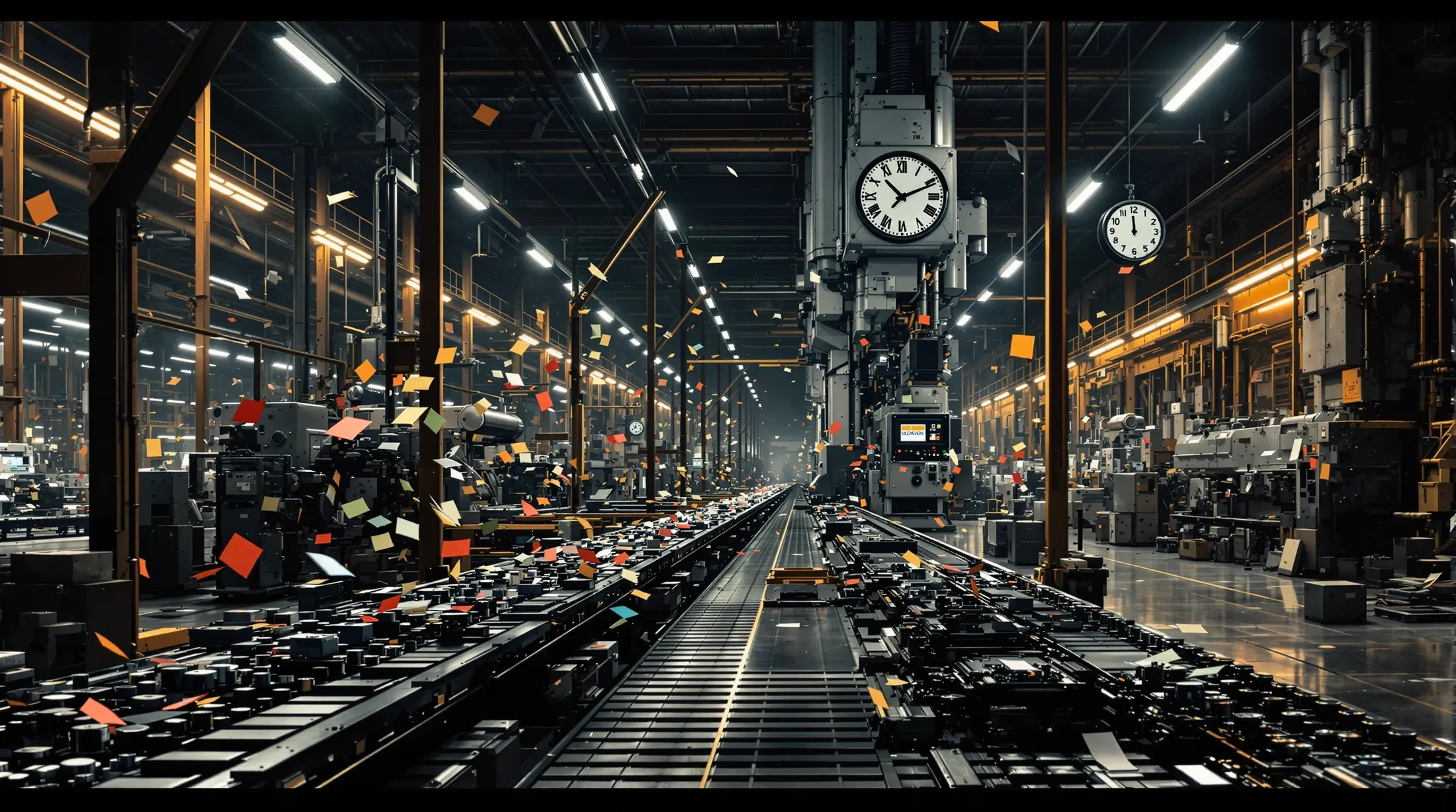Production Line Worker: Job Description, Responsibilities, and Salary
Looking to understand the vital role of Production Line Workers in modern manufacturing? These skilled professionals are the backbone of industrial production, ensuring the seamless creation of products we use daily. Let’s explore their responsibilities, work environment, and essential contribution to the manufacturing sector.
What is a Production Line Worker?
A Production Line Worker is an essential employee in the manufacturing industry who operates on assembly lines to create various products. These professionals execute specific, often repetitive tasks as part of a coordinated team effort to assemble, inspect, and package goods. Working in factories or manufacturing plants, they handle everything from automotive parts to consumer electronics, food products, and countless other items requiring assembly-line production.
Production line workers operate in structured environments where efficiency and precision are paramount. They follow established procedures to ensure consistent product quality while adhering to production schedules. Depending on the specific industry, they may work with sophisticated machinery or perform manual assembly tasks using hand tools.
Overview of the Role
- Working in teams on assembly lines
- Assembling finished products using various tools and machinery
- Fabricating individual parts for completed items
- Following specific assembly procedures
- Identifying quality issues before product advancement
- Operating machinery and using hand tools
- Maintaining physical stamina for extended standing periods
Importance in the Manufacturing Process
Production line workers form the critical operational foundation of manufacturing industries worldwide. Without these skilled individuals, the mass production of goods that modern economies depend on would be impossible. Their expertise enables manufacturers to:
- Transform raw materials into finished consumer products
- Maintain consistent quality standards
- Meet market demands efficiently
- Reduce manufacturing costs through standardized processes
- Provide first-line quality control
- Adapt to evolving manufacturing technologies
Key Responsibilities of a Production Line Worker
Production line workers serve as the backbone of manufacturing operations, performing critical tasks that ensure products are assembled correctly and efficiently. Their core responsibilities include receiving components, assembling parts, and operating specialized machinery while maintaining consistent quality standards.
Daily Tasks and Duties
- Attending shift briefings for production goals
- Performing specific assembly tasks using specialized tools
- Conducting visual inspections of products
- Documenting production numbers
- Cleaning and organizing workstations
- Rotating positions to prevent fatigue
- Participating in team meetings for process improvements
Quality Control and Safety Protocols
| Quality Control Tasks | Safety Protocols |
|---|---|
| Monitor product quality | Use proper PPE equipment |
| Perform visual inspections | Follow safety guidelines |
| Document quality issues | Participate in safety training |
| Alert supervisors of concerns | Maintain clear work areas |
| Ensure specification compliance | Follow lockout/tagout procedures |
Skills Required for a Production Line Worker
Success as a production line worker requires a combination of technical prowess and physical capabilities. While formal education requirements are typically minimal, employers prioritize practical skills that directly impact manufacturing efficiency and product quality. Essential attributes include precise manual dexterity, physical strength for material handling, and the ability to accurately follow production instructions.
- Manual dexterity for precise tool handling
- Physical strength for heavy lifting
- Blueprint and schematic interpretation skills
- Stamina for prolonged standing
- Adaptability to new technologies
- Previous manufacturing experience (preferred)
Technical Skills
| Skill Category | Required Capabilities |
|---|---|
| Manual Operations | Hand tool proficiency, machinery operation, component assembly |
| Quality Control | Measuring tool usage, inspection techniques, defect identification |
| Safety Knowledge | Equipment operation protocols, material handling procedures |
| Mathematical Skills | Component measurement, production counting, quantity verification |
| Digital Literacy | Control system interface, production data entry, basic computer operation |
Soft Skills
- Clear communication in noisy environments
- Active listening for accurate instruction comprehension
- Problem-solving abilities for production issues
- Team collaboration and coordination
- Adaptability to changing production requirements
- Detail orientation for quality maintenance
- Time management for meeting production quotas
- Initiative in identifying and reporting issues
Work Environment and Conditions
Production line workers typically operate in indoor manufacturing facilities that may lack climate control, resulting in varying temperature conditions. The environment features assembly lines, conveyor systems, and industrial machinery, with workers primarily standing at designated stations performing repetitive tasks. Constant machinery noise necessitates proper hearing protection, while production quotas create a structured, often fast-paced atmosphere.
Typical Work Setting
- Factory floors with organized assembly lines
- Strategic workstation positioning
- 8-12 hour shift schedules
- Multiple shift options (day, evening, overnight)
- Regular overtime opportunities
- Designated break areas
- Team-oriented atmosphere
Health and Safety Considerations
| Safety Requirements | Health Considerations |
|---|---|
| Safety glasses and ear protection | Extended standing periods |
| Hard hats and steel-toed boots | Repetitive motion strain |
| Protective gloves | Physical fatigue management |
| Regular safety training | Ergonomic practices |
| Environmental protection gear | Workplace wellness programs |
Salary Expectations for Production Line Workers
Production line workers form an essential component of the manufacturing industry, with compensation packages reflecting both job importance and market dynamics. While formal education requirements are minimal, the pay scale provides a stable income for workforce entrants. The physical demands and technical expertise required significantly influence earnings, particularly given the extended 8-12 hour shifts that may include overnight or weekend work.
| Compensation Component | Details |
|---|---|
| Base Package Elements | Shift differentials, performance incentives, production bonuses |
| Physical Requirements | Manual dexterity, strength, sustained attention to detail |
| Career Progress | Experience-based increases, union benefits, retention rewards |
Average Salary Range
- Annual salary range: $28,000 – $45,000
- Entry-level hourly rates: $12 – $18
- Specialized sectors (automotive, aerospace): Higher wages
- Urban centers: 15-20% higher than rural areas
- Union positions: Up to $50,000-$60,000 annually
- Overtime opportunities: Time-and-half or double-time rates
Factors Influencing Salary
| Factor | Impact on Compensation |
|---|---|
| Experience Level | 15-25% increase with 5+ years |
| Industry Sector | Higher rates in automotive, aerospace, pharmaceutical |
| Company Size | Large corporations offer better packages |
| Technical Certifications | Higher starting wages |
| Benefits Package | 20-30% value addition to base salary |
Career Advancement Opportunities
The manufacturing sector offers diverse advancement pathways despite minimal initial educational requirements. Workers can progress from entry-level positions to specialized roles, with experience and reliability serving as key advancement factors. The industry provides multiple career tracks, including quality control, maintenance, logistics, and production management.
Pathways to Promotion
- Team Lead/Line Coordinator positions combining hands-on work with leadership
- Shift Supervisor roles with increased authority and responsibility
- Manufacturing Technician specializations
- Process Improvement Technician opportunities
- Quality Control Specialist positions
- Maintenance and machine setup roles
- Calibration Technician certifications
- Labor Relations Manager tracks
- Production Manager career paths
- Purchasing Agent positions
Further Training and Education
While formal education isn’t mandatory for entry-level production line work, pursuing additional training significantly enhances career advancement prospects. Many manufacturers provide internal training programs that teach valuable skills in equipment operation, quality inspection, and lean manufacturing principles – all at no cost to employees who show initiative.
- Community college programs offering certificates in manufacturing technology
- Technical school degrees in industrial maintenance
- Supply chain management certifications
- Professional credentials through MSSC (Manufacturing Skill Standards Council)
- Association for Supply Chain Management certifications
- On-the-job cross-training opportunities
- Mentorship programs with experienced colleagues
| Educational Path | Career Opportunities |
|---|---|
| Industrial Engineering Degree | Design Engineer, Process Engineer |
| Electrical Technology Certificate | Electrical Technician, Maintenance Specialist |
| Manufacturing Engineering Degree | Manufacturing Engineer, Production Manager |
Even without pursuing formal education, workers who actively engage in continuous learning through cross-training and mentorship programs position themselves favorably for internal promotions. This combination of practical experience and targeted skill development creates multiple pathways for career advancement in manufacturing environments.







